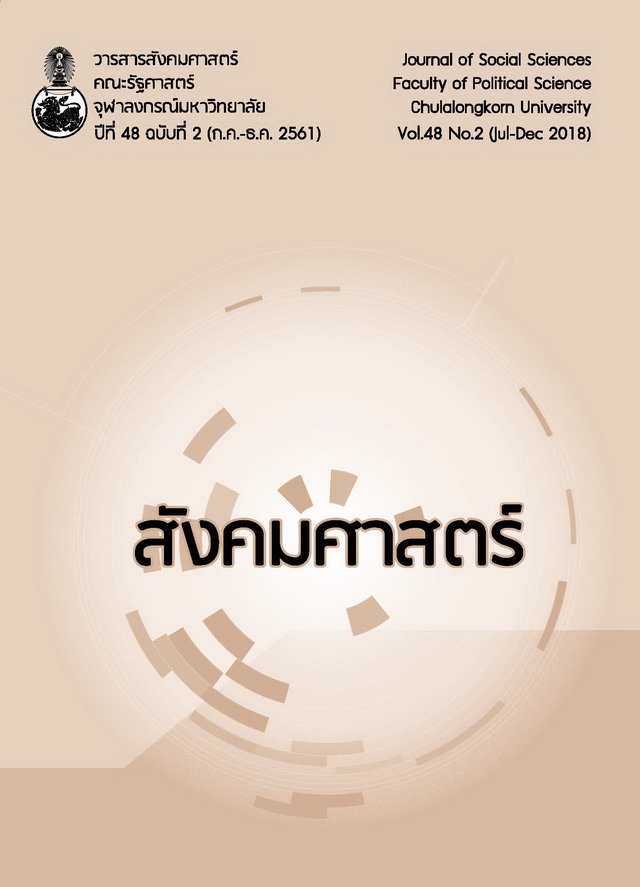Legitimacy and Overthrow of Tyrants: Confucian Viewpoint from Chinese History
DOI:
https://doi.org/10.61462/cujss.v48i2.752Keywords:
legitimacy, overthrow of tyrants, Confucian, the Mandate of Heaven, the virtues of individual rulersAbstract
Legitimacy in politics, according to Confucian viewpoint, originated from the two sources, i.e. the Mandate of Heaven and the virtues of individual rulers. Confucianism requires all rulers, whether coming to the throne hereditarily or by overpowering tyrants, are required to deliver justice on behalf of heaven. Meanwhile, the individuals’ virtues are seen as the main factors to judge whether the said rulers were able to maintain the Mandate of Heaven or not, and to exert pressure on them to act with righteousness. Confucian political philosophy is regarded as highly conservative, focusing strictly as it does on virtues, ethics, and observation of customs. Nevertheless, it also presents discourses to be used against tyrants, thereby giving legitimacy in overthrowing them.
Downloads
References
Chen, Guying.2007. ZhuangziJinzhu Jinyi. [The Works of Zhuangzi in Modern Chinese Translation]. Beijing: The Commecial Press. (in Chinese)
Gao, Wang, and Zhang Sanxi. 2010. Hanfeizi. [The Works of Hanfeizi in Modern Chinese Translation]. Beijing: Zhonghua Book Company. (in Chinese)
He, Lin. 1996. Wulun Guannian de Xin Jiantao. [Critically Examining the Concept of Five Relationships]. Beijing: The Commercial Press. (in Chinese)
Jin, Guantao, and Liu Qingfeng. 2011. Zhongguo Xiandaisixiang de Qiyuan: Chaowending jiegou Yu Zhongguo Zhengzhi Wenhua de Yanbian. [The Cycles of Growth and Decline on Ultrastable Chinese Society]. Beijing: The Law Press. (in Chinese)
Liu, Zehua, and Ge Quan, eds. 2001. Zhongguo Gudai Zhengzhi Sixiangshi. [A History of Ancient Chinese Political Thought]. Tianjin: Nankai University Press. (in Chinese)
Sun, Jiazhou. 1987. “Xianqin Zhuzi Lun ‘Tangwu Gemming.’” [The Discussion of ‘the Tang and Wu Revolts’ by Hundred Schools of Thought]. Social Science Research 9(1): 112–114. (in Chinese)
Tang,Yijia, and Li Zhonghua, eds. 2011. Zhongguo Ruxueshi: Songyuan Juan. [A History of Chinese Confucian Thought: Song Yuan Periods]. Beijing: Peking University Press. (in Chinese)
Weibo, Makesi. 2004. Weibo Zuopinji II Jingji Yu Lishi Zhipei de Leixing. [Selected works of Weber II Economy and Society: The Three Types of Legitimate Rule]. Nanning: Guangxi Normal University Press. (in Chinese)
Wu, Huan. 2014. “Guozhi Linghun: Xianqin ‘Tianming-Geming’ Guan Ji Qi Fazhexue Yihan.” [The Spirit of the Political System of the State: Pre-Qin Viewpoints and Philosophy on the Significance of “the Mandate of Heaven – the Revolution”]. Yuandao 9(1): 164–178. (in Chinese)
Yu, Jingang. 2010. “Rujia Chuantong Geming Huayu de Jindai Zhuanhua.” [Change in the Modern Times of Revolutionary Discourse in Traditional Confucian Thought]. Qianyan 17(22): 128–131. (in Chinese)
Zhao, Kangtai, and Li Yinghua. 2006. Zhongguo Chuantong Sixiang Zhengzhijiaoyu Lilun Shi. [The Tradition of Chinese Confucian Thought: A History of Political Education Theories]. Wuhan: Central China Normal University Press. (in Chinese)
Zhou, Guidian. 2001. Tianminglun Yu Zhongguo Gudai Zhexue. [The Mandate of Heaven Theory and Ancient Chinese Philosophy]. Southeast University Philosophy and Social Science Journal 3(3): 14-19. (in Chinese)
Zhu, Xi, comp. 2010. Sishu Zhangju Jizhu. [The Four Books: Annotated]. Beijing: Zhonghua Book Company. (in Chinese)
Downloads
Published
How to Cite
Issue
Section
License
Copyright (c) 2018 Faculty of Political Science, Chulalongkorn University

This work is licensed under a Creative Commons Attribution-NonCommercial-NoDerivatives 4.0 International License.
Public Licensing Terms
Copyright and Licensing Policy
The Chulalongkorn University Journal of Social Science publishes all content under the Creative Commons Attribution-NonCommercial-NoDerivatives 4.0 International License (CC BY-NC-ND 4.0).
Copyright
All published articles in the Chulalongkorn University Journal of Social Science are the copyright of the Faculty of Political Science, Chulalongkorn University. Authors transfer all rights to the journal upon acceptance of their manuscript for publication.
CC BY-NC-ND 4.0 License
Under this license:
-
Attribution (BY): Users must give appropriate credit to the authors, the Faculty of Political Science, Chulalongkorn University, and the Chulalongkorn University Journal of Social Science, provide a link to the license, and indicate if changes were made. They may do so in any reasonable manner, but not in any way that suggests the licensor endorses them or their use.
-
NonCommercial (NC): Users may not use the material for commercial purposes. Commercial use requires prior written permission from both the authors and the Faculty of Political Science, Chulalongkorn University.
-
NoDerivatives (ND): If users remix, transform, or build upon the material, they may not distribute the modified material. Adaptations of the work require prior written permission from both the authors and the Faculty of Political Science, Chulalongkorn University.
Open Access Statement
The Chulalongkorn University Journal of Social Science provides immediate open access to its content on the principle that making research freely available to the public supports a greater global exchange of knowledge. Users are allowed to read, download, copy, distribute, print, search, or link to the full texts of the articles without asking prior permission from the publisher or the author, in accordance with the CC BY-NC-ND 4.0 license.
Self-Archiving Policy
Authors may archive the final published version, preprints, or postprints of their articles in institutional repositories or on their personal websites, provided that they acknowledge the original publication in the Chulalongkorn University Journal of Social Science with a complete citation and a link to the journal's website.
Permissions
For any use beyond those covered by the CC BY-NC-ND 4.0 license, please contact:
Editorial Office
Chulalongkorn University Journal of Social Science
Faculty of Political Science, Chulalongkorn University
Email: cusocscij@gmail.com
For more information about the Creative Commons Attribution-NonCommercial-NoDerivatives 4.0 International License, please visit: https://creativecommons.org/licenses/by-nc-nd/4.0/





